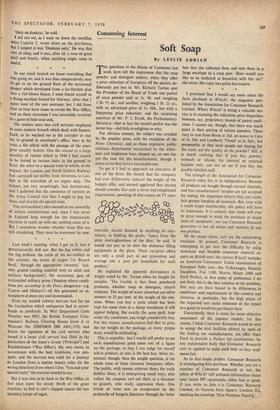Consuming Interest
Soft Soap
By LESLIE ADRIAN THE questions in the House of Commons last week have left the impression that the soap powder and detergent makers, when they offer a price reduction of fourpence off the packet, de- liberately put less in. Mr. Richard Turton sent the President of the Board of Trade one packet of soap powder sold at Is. 9d. and weighing 1 lb. 9+ oz.; and another, weighing 1 lb. 21 oz., with an advertised price of Is. 10d., but with a fourpenny price reduction; and the surprising assertion of Mr. F. J. Erroll, the Parliamentary Secretary—that in fact the second packet was the better buy—did little to enlighten us why.
For obvious reasons, the subject was avoided by the popular press, with the exception of the News Chronicle; and as those expensive public relations departments maintained by the white- ness and brightness boys slipped up, no one has put the case for the manufacturers, though it seems to me they have a reasonable one.
To get it I had to approach an executive of one of the firms. He denied that his company had ever deliberately reduced the weight of the bargain offer, and seemed aggrieved that anyone should consider that such a clever and enlightened organisation, spending all that money on TV com- mercials, should descend to anything so reac- tionary as fiddling the packs. 'Apart from the plain shortsightedness of the idea,' he said, 'it would not pay us to alter the elaborate filling equipment in the plant. These cut-price offers are only a small part of our promotion and average one a year per household for each product.'
He explained the apparent discrepancy in weight noted by Mr. Turton when he bought his samples. 'The trouble is that these powdered products, whether soap or detergent, absorb moisture. The weight of water absorbed can often amount to 25 per cent. of the weight of the con- tents. When you buy a pack which has been kept for some time in a damp warehouse it will appear bulging. But exactly the same pack, kept under dry conditions, can weigh considerably less. For this reason, manufacturers feel that to print the net weight on the package, as many people want, would be misleading.'
This, is arguable : but I would still prefer, to see each manufacturer print some sort of a figure on the package, so that I can judge for myself which product, or size, is the best buy. More im- portant, though, than the weight question, is the whole issue of these tiresome fourpenny offers. The public, with reason, mistrust them; the trade dislikes them; it is enterprising small boys, who collect the coupons and sell them at a discount to grocers, who really appreciate them. One friend of mine was so exasperated by the avalanche of bargain literature through her letter box that she collected them and sent them in a large envelope to a soap peer. 'How would you like to be bothered at breakfast with this lot?' she wrote. His reply was polite but evasive.
*
I promised that I would say more about the facts disclosed in Which?, the magazine pub- lished by the Association for Consumer Research Limited. Where Which? is doing a valuable ser- vice is in exposing the ridiculous price disparities between, say, proprietary brands of patent medi- cines. I cannot see, though, that there was much point in their pricing of talcum powders. These vary in cost from Boots at 30. an ounce to Coty at Is. 10d. and Lentheric 'Tweed' at 2s. Old.; but presumably at that level people are buying for the scent, not the quality of the powder? Still, it is worth realising that if you buy powder, stomach or talcum, for internal or external hygiene only, you are an ass if you buy the gaudily-labelled stuff.
The strength of the Association for Consumer Research today lies in its independence. Because all products are bought through normal channels, and free manufacturers' samples are not accepted for testing, the organisers believe they can main- tain greater freedom of comment. But, even with a much larger membership, this policy will have its limitations. It is unlikely that funds will ever be great enough to stand the purchase of major items of equipment : nor can Consumer Research guarantee to test all makes and varieties of any one product.
Of the major items, cars are the outstanding omission. At present, Consumer Research is attempting to get over the difficulty by using American and Swedish consumer research re- ports on British cars; the current Which? includes an American Consumers' Union examination of European baby cars—the Volkswagen, Renault Dauphine, Fiat 1100, Morris Minor 1000 and Ford Prefect, in that order of preference. I do not think this is the best solution to the problem. Not only are there bound to be differences in conditions and requirements in this country and America, in particular, but the high prices of the imported cars make nonsense of the report as a guide to would-be purchasers here.
Undoubtedly there is room for more objective assessment of the popular models; for this reason, I think Consumer Research would be wise to accept the trial facilities offered by most of the leading car manufacturers. An offer from Ford to provide a Prefect for examination 'by any independent body that Consumer Research care to appoint to make such tests as they wish' seems fair.
As its first major project, Consumer Research is investigating hire purchase. Whether you are a member of Consumer Research or not, the editor of Which? will welcome information about your recent HP agreements, either bad or good, if you write to him c/o Consumer Research Limited, 16 Victoria Park Square, London, E2, marking the envelope 'Hire Purchase Inquiry.'


































 Previous page
Previous page